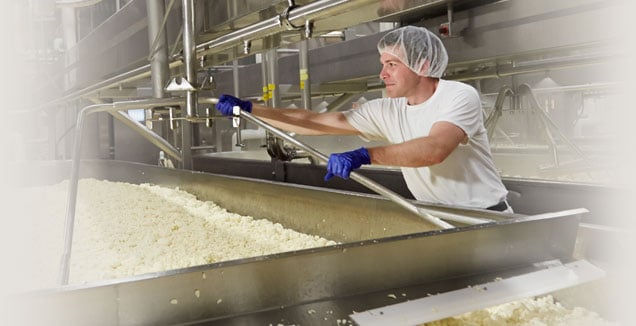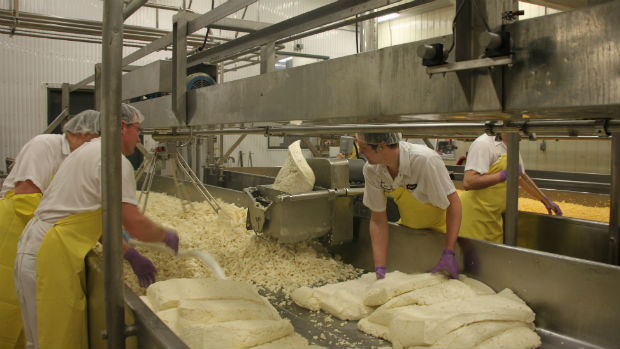An In-Depth Appearance at Cheese Production: Active Ingredients, Methods, and the Future of Craftsmen Cheeses
The complex process of cheese manufacturing is an interesting merging of art and science, where top quality milk, rennet, and specific bacterial societies offer as foundational elements. As the sector progressively focuses on sustainability and openness, the future of artisan cheeses guarantees to mirror both heritage and development.
Secret Components in Cheese Manufacturing
A selection of crucial components play a critical function in cheese manufacturing, each contributing to the final item's flavor, texture, and personality. The primary active ingredient in cheese is milk, which can come from numerous resources, consisting of cows, goats, and lamb - cheese for sale online. The kind of milk utilized significantly affects the cheese's taste and consistency; as an example, cow's milk commonly yields creamier cheeses, while goat's milk commonly creates zesty ranges
Another vital ingredient is rennet, an enzyme utilized to curdle the milk, dividing it into curds and whey. The resource of rennet can be animal, veggie, or microbial, each giving distinct qualities to the cheese.
Salt not just boosts the flavor yet also acts as a preservative, hindering the development of undesirable bacteria. Additionally, different flavoring agents, such as herbs, seasonings, or also smoked wood, can be included to develop distinct artisanal cheeses. Together, these ingredients form the structure of cheese manufacturing, setting the stage for varied and rich cheese varieties.
Typical Cheese-Making Strategies
Using typical cheese-making methods, craftsmens around the globe maintain classic techniques that have been given via generations. These methods typically highlight making use of premium, in your area sourced milk, which is main to the one-of-a-kind flavors and textures of artisanal cheeses. The process typically begins with the mindful home heating of milk, followed by the addition of societies and rennet to assist in coagulation.
As soon as the curds form, they are reduced, allowing whey to drain pipes, a crucial action that affects moisture content and appearance. Salting is a crucial aspect of this process, boosting flavor while likewise acting as a preservative.
Aging, or affinage, is another crucial component, throughout which cheeses create their particular aromas and tastes. Artisans might utilize certain aging environments, using moisture and temperature controls to improve celebrity's account. The dedication to these standard approaches not just sustains regional economies yet additionally adds to the abundant variety of cheese selections discovered internationally, commemorating social heritage and artisanal craftsmanship.
Modern Developments in Cheese Manufacturing
Exactly how have technological developments transformed cheese manufacturing in the last few years? The integration of modern technology has actually changed both the efficiency and quality of cheese production. Automation in numerous phases of the procedure-- from curd formation to packaging-- has improved consistency while other decreasing labor costs. As an example, automated curd reducing and mixing systems enable specific control over structure and wetness degrees, crucial variables affecting the end product.
In addition, developments in microbiology have allowed cheesemakers to select certain bacterial societies and enzymes, enhancing taste accounts and improving life span. The use of sensing unit technology for monitoring fermentation problems has actually likewise become prevalent, enabling real-time changes to preserve ideal settings for cheese aging.

These improvements not just boost the quality and sustainability of cheese manufacturing however also equip craftsmen manufacturers to keep standard flavors while welcoming modern performance. As modern technology proceeds to develop, the future of cheese manufacturing looks promising, mixing custom with innovation.
The Function of Terroir in Cheese
In the realm of cheese manufacturing, terroir plays a pivotal role in defining the unique features of numerous cheeses. Terroir, a French term generally linked with white wine, includes the environmental elements that influence agricultural products, including soil structure, environment, and local vegetation and animals. In cheese-making, the distinct features of the area where the milk is sourced can impart certain flavors and structures to the final product.
As an example, the grazing problems of milk animals significantly influence the milk's make-up, affected by the kinds of turfs and herbs readily available in a certain locale. This varies not just in between countries however likewise between areas within the exact same country. Additionally, the microbial areas present in the atmosphere add to the fermentation processes, leading to diverse profiles in taste and fragrance.
Cheeses such as Roquefort, Parmigiano-Reggiano, and Cheddar exhibit just how terroir can form their identifications, making them unique and often secured by geographical indications. As manufacturers progressively recognize the relevance of terroir, there is a growing emphasis on sourcing neighborhood components and maintaining standard practices, making sure that each cheese genuinely reflects its origin.

Future Fads in Craftsmen Cheeses
A remarkable shift is taking our website place in the craftsmen cheese field, driven by advancing consumer preferences and technical innovations. find more information Significantly, customers are gravitating toward one-of-a-kind, high-grade items that highlight both sustainability and regional sourcing - cheese store melbourne. This pattern is prompting artisan cheesemakers to introduce, concentrating on small-batch manufacturing and using conventional methods while incorporating modern technology to enhance quality and safety and security
Additionally, there is a growing interest in plant-based and alternate dairy items, pushing standard cheesemakers to discover new methods, such as cashew or almond-based cheeses. This shift not just deals with dietary restrictions however additionally aligns with environmental problems concerning pet farming.
In addition, openness in sourcing and production processes is becoming critical. Consumers are more informed and need traceability, motivating manufacturers to adopt clearer labeling practices and participate in narration that highlights their approaches and worths.
Conclusion
Finally, the detailed process of cheese production blends conventional strategies with modern innovations, resulting in a diverse array of tastes and structures. The focus on premium active ingredients and the impact of terroir highlight the artistry involved in cheese production. As the industry develops, a concentrate on sustainability and openness will likely shape the future of artisan cheeses, satisfying a significantly discerning consumer base that values authenticity and craftsmanship in dairy items.